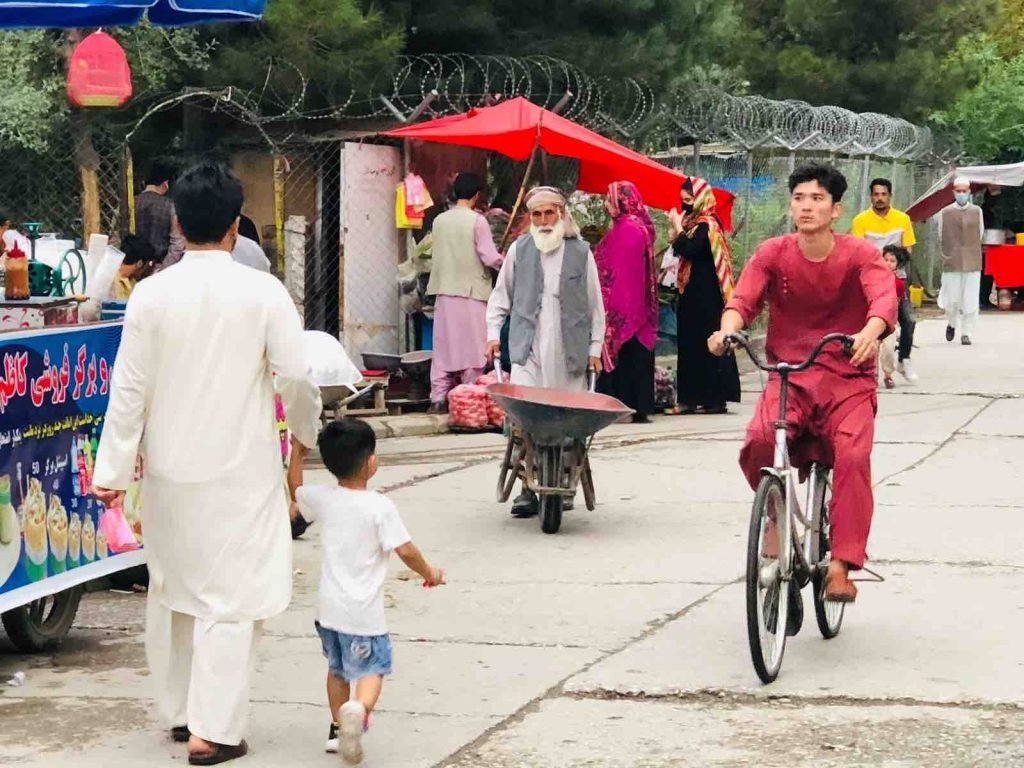Engaging with the Taliban: A Path to Development and Peace in Afghanistan?

Kabul 2022 Photo: @AADIL
By Hamid Pakteen
Afghanistan’s turbulent history, marked by decades of conflict, has left the country in a dire state. Taliban’s return to power has raised concerns about the future of the nation and its people. The Taliban’s pursuit of establishing diplomatic ties with the global community, including seeking relief from counterterrorism measures and the unfreezing of Afghan financial resources, has been met with hesitation and skepticism. Despite the Taliban’s control over the entirety of Afghanistan for over two years, no nation has formally acknowledged their self-declared Islamic Emirate. However, with the years passing, the world is waking up to the hard reality of the need to engage directly with the Taliban. This article delves into this complex situation, highlighting the reasons for engagement, the obstacles faced, and the potential benefits for the Afghan people.
The Taliban’s Quest for Normalization
Since their return to power in Afghanistan in August 2021, the Taliban have been seeking recognition and engagement with the international community. However, several significant obstacles stand in the way of normalizing relations with the Taliban. One of the most concerning aspects of the Taliban’s rule is their oppressive policies towards women. The ban on secondary education for girls and growing restrictions on women’s rights signal a disregard for the rights of more than 50 percent of Afghanistan’s population. Taliban has not shown any flexibility in relaxation of these oppressive policies despite international pressure. The second aspect is the failure of the Taliban to form an inclusive government. The international community has called for a government that represents all elements of Afghan society. This is compounded by the fact that despite the Taliban’s control over Afghanistan for over two years, security incidents, including armed clashes and high-profile terrorist attacks, have continued to rise in the region especially in Pakistan which has categorically blamed Taliban-led Afghanistan for the terror attacks in the length and breadth of their country.
Economic Challenges and Humanitarian Crisis
The economic situation in Afghanistan remains precarious. Per capita income has collapsed to 2007 levels, and the details behind the Taliban’s claims of economic growth remain unclear. Afghanistan’s isolation from the international banking system has contributed to liquidity problems. Even humanitarian funding is uncertain, with the 2022 humanitarian response plan receiving only a fraction of the required funding.
The narcotics ban enforced by the Taliban has led to an increase in opium prices, and severe droughts have devastated food harvests. This dire economic situation is pushing many Afghans to the brink of starvation, making engagement with the Taliban essential to address these pressing humanitarian issues.
Engagement as the Way Forward
Given the challenges and risks associated with non-engagement, it is imperative for the international community to continue dialogue with the Taliban. The international community has to adopt a pragmatic approach, with the focus could initially be to deepen trade ties and build stability in Afghanistan to prevent its collapse. The consequences of further fragmentation, isolation, and poverty in Afghanistan could lead to further mass migration and refugee crisis, a conducive environment for terrorism, and greater suffering for the Afghan population. Engaging with the de-facto rulers of Afghanistan presents several potential benefits:
Humanitarian Relief: Engagement can help secure the release of frozen Afghan assets and provide much-needed funds to revive the banking system. This, in turn, will facilitate the delivery of humanitarian aid and alleviate the suffering of the Afghan people. Fulfilling the Secretary-General’s appeal for $4.2 billion in humanitarian and economic assistance is crucial to meet the immediate needs of the Afghan people.
Economic Stability: The early resumption of reconstruction activities, regional connectivity projects, and economic partnerships can pave the way for economic growth and stabilization in Afghanistan. This requires the release of Afghanistan’s frozen national reserves.
Countering Terrorism: Engagement can encourage and push the Taliban to take more concrete steps to fulfill their commitments to counter-terrorism and dissuade Afghanistan acting as safe haven for terrorist groups. Preventing Afghanistan from becoming terror hotspot is in the interest of the international community.
Women’s Rights: Engagement offers an opportunity to advocate for women’s rights in Afghanistan. While the Taliban’s policies have been oppressive, dialogue and diplomacy can help address these issues. Direct engagement and a comprehensive package would put real pressure on the de-facto rulers to take positive steps on women’s education and employment.
Regional powers such as Russia and China have already been directly engaging with the Taliban to increase their reach in the mineral-rich country. The recently conveyed Russian-led meeting on Afghanistan in Kazan, Russia was attended by senior Taliban leadership and also representatives from countries such as China, Pakistan, Iran, India, Kazakhstan, Kyrgyzstan, Turkmenistan, Uzbekistan, Qatar, United Arab Emirates, Saudi Arabia and Turkiye. This is the fifth such meeting hosted by Russia under this format and the first one with such wide participation. The Kazan Declaration said the forum had called on the Taliban establishment to “take effective measures to dismantle, eliminate and prevent the placement of all sorts of terrorist groups based in Afghanistan and to prevent the country from being the terrorism and instability hotspot and spreading to the regional states”. The declaration also appreciated the Taliban’s efforts though the official position of Taliban leadership has been against the imposition of any governance model to their present government in Afghanistan, they would be more amenable to this to facilitate access to funds/resources.
West has also been exploring various mechanisms to directly engage with Taliban leadership. As a step towards engagement, US government officials have earlier appreciated the efforts of the Taliban on the drugs domain especially the ban on opium cultivation. Further, there has not been any serious support from the Western countries for the calls from some Afghan groups that seek assistance in toppling the Taliban regime. The general thought process is that meaningful reforms and changes in the war-ravaged nation should originate from within Afghanistan rather than being imposed through external pressure.
However, human rights organizations continue to advocate for increased international pressure on the Taliban, including classifying Taliban-run Afghanistan as a gender-apartheid regime and prosecuting Taliban leaders for crimes against humanity.
The situation in Afghanistan is critical, and the path to development and peace is fraught with challenges. Engaging with the Taliban is not without risks, but it offers a glimmer of hope for the Afghan people. In this direct engagement, the international community must prioritize humanitarian relief, economic stability, countering terrorism, and women’s rights. With the Taliban rule in Afghanistan stabilized and no credible opposition either from within or from outside, non-engagement with the Taliban appears no more an option; it will only lead to further suffering for the Afghan people and instability in this war-weary nation.
Hamid Pakteen is a researcher based in Afghanistan.
Note: The contents of the article are of sole responsibility of the author. Afghan Diaspora Network will not be responsible for any inaccurate or incorrect statement in the articles.






